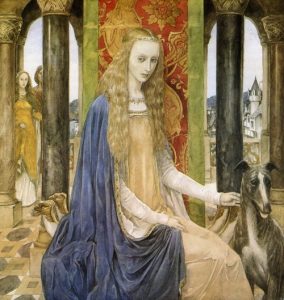 We don’t often think of medieval romance (in the genre sense, not the emotional sense) as being a hotbed of queer themes, but try this on for size. As magical punishment for committing and abetting a sexual assault, two brothers are condemned to be transformed into pairs of animals–male and female in alternation–to learn to overcome their bestial nature and gain a deeper appreciation of women’s experiences. Cycling through the forms of deer, then pigs, then wolves, they take turns begetting and bearing sons, until all of them–the brothers Gwydion and Gilfaethwy and their three offspring–are returned to human form. Although the sexual activity is glossed over in the original text, the results are not.
We don’t often think of medieval romance (in the genre sense, not the emotional sense) as being a hotbed of queer themes, but try this on for size. As magical punishment for committing and abetting a sexual assault, two brothers are condemned to be transformed into pairs of animals–male and female in alternation–to learn to overcome their bestial nature and gain a deeper appreciation of women’s experiences. Cycling through the forms of deer, then pigs, then wolves, they take turns begetting and bearing sons, until all of them–the brothers Gwydion and Gilfaethwy and their three offspring–are returned to human form. Although the sexual activity is glossed over in the original text, the results are not.
The Welsh tale Math fab Mathonwy, also known as the Fourth Branch of the Mabinogi, is full of familiar fantasy tropes, such as enchanting rubbish to appear as treasure in order to cheat in a bargain, the use of a magic wand to perform transformations, and the hero who can only be killed if he participates in an improbable taboo scenario. One less usual theme is the nature of parenthood and the use of both magic and technology to achieve alternative paths to fathering children.
Magical sex-changing shape-shifting is only one of those paths. The story also features a mechanism that I can only visualize as an artificial womb similar to those that feature in Lois McMaster Bujold’s Vorkosigan universe. A woman is put under magical compulsion regarding her supposed virginity, and as a result gives birth to two children, representing the her two past sexual encounters. One encounter was year previous and the child emerges fully grown, as if he had been begotten at the time. But the second encounter was recent enough that the offspring is a tiny embryo, unable to survive on its own.
Gwydion takes the embryo and conceals it in “a small chest, next to his bed” where it survives and grows until one day he hears a faint cry from within the chest and opens it to find a baby. There is no suggestion of a mechanism for this incubation–this is a tale of magic and magicians, after all–but as with the shape-shifting sex, the conclusions are clear from the results.
Queer Fantasy Roots explores stories and themes from history that may inspire or resonate with queer fantasy fiction being written today. Heather Rose Jones writes fantasy and historical fiction centering around queer women, and writes the Lesbian Historic Motif Blog at alpennia.com.


